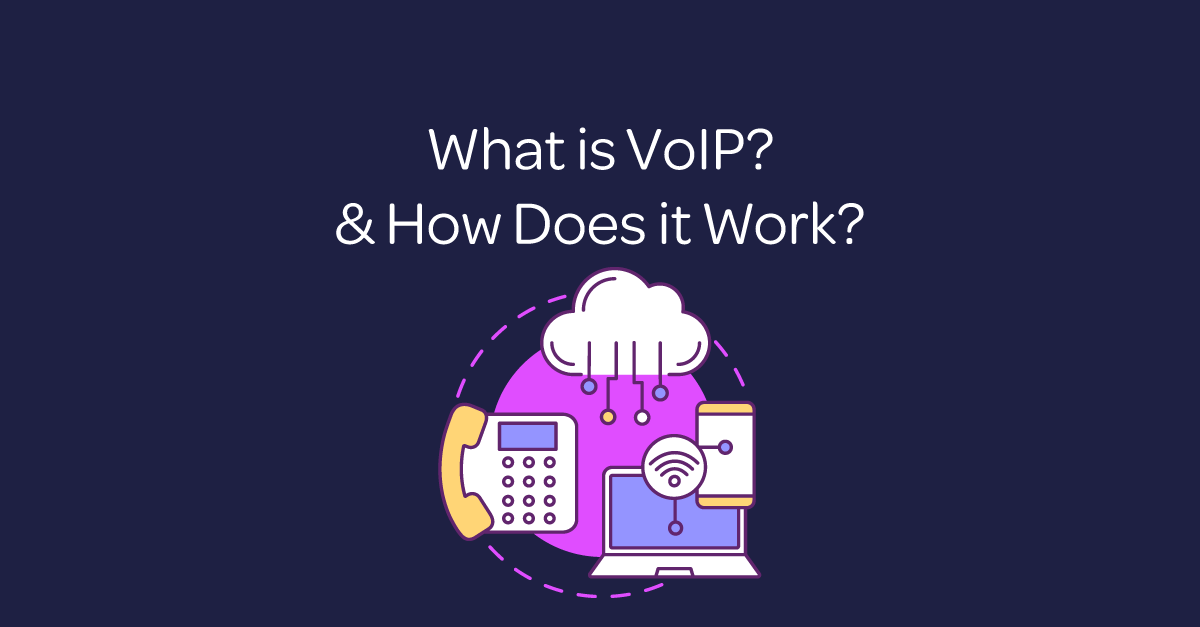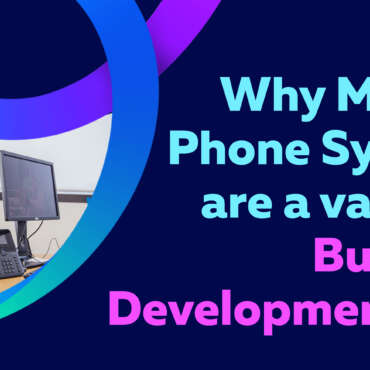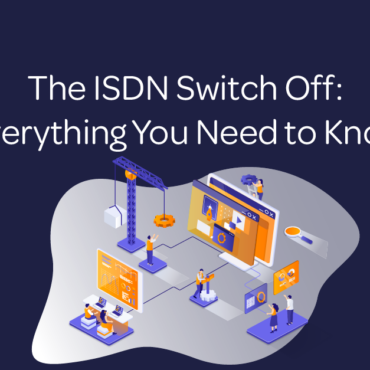The internet is changing the way businesses communicate – and VoIP technology is the driving force.
What is VoIP?
VoIP means ‘Voice Over Internet Protocol’.
It’s the technology that allows you to make and receive calls over the internet. Yep, that’s right: you no longer need to use traditional ISDN phone lines.
Instead, you can power your phone system using the internet. The times are changing, VoIP is taking over, traditional phone lines are being shut down, and it’s all very exciting for businesses.
How Does VoIP Work?
When you use a VoIP phone system, you’re speaking to the other person over an internet connection. For example, you probably use Zoom, Teams, or Facebook Messenger, right? When you call someone on one of these apps, you’re using VoIP technology.
A VoIP system conducts calls in an easy-to-handle, modern way. When compared to making calls on a traditional phone system, VoIP is on a whole other level. From beginning to end, this is how a VoIP call happens:
Step 1: You choose the number you want to dial
Step 2: Your phone system tells the VoIP provider to call the number
Step 3: The call begins and tiny little packets of digital data are exchanged over the internet, which allows your voice to reach the other side
Step 4: The VOIP system continuously converts digital signals into audio, meaning you and the person your calling can hear each other
Step 5: After the conversation is finished, you can end the call.
Now that technology has advanced so far, VoIP systems now use SIP technology (which is basically the glue that holds internet calls together), meaning calls are now much faster and cheaper.
The Strengths of VoIP
VoIP is changing the future of business communications. Here’s what makes it so appealing:
Cost savings
Right now, times are tough – particularly for small and medium-sized businesses.
Due to the impact of the COVID-19 pandemic, and now the cost-of-living crisis, many businesses are desperate to save money.
Hardware – well… You don’t need any!
Maintenance
You are completely free to change or update your system at any time with no added installation purchases
Calling fees
With SIP technology, VoIP systems avoid paying long-distance fees, and international calls are far, far cheaper
Remote working
Your number represents your account, not your physical location, so it travels with you wherever you go.
Higher quality sound
Most VoIP systems use advanced technology that processes your voice more clearly than traditional phone systems can. After all, no customer wants to speak to a representative whose voice is crackling and hard to make out.
More advanced features Apart from being able to leave voicemails and put customers on hold, traditional phone systems don’t have many other features, right? It’s all very basic.
Advanced Features
VoIP systems come with tons more features than traditional phone systems.
Want to know the best ones? Here they are:
Over the past couple of years, working from home has become hugely popular. Initially, remote working was only meant to last for a couple of months whilst the initial COVID-19 lockdown was taking place, and many of them decided to keep their remote work models in place. So, if your business is currently allowing employees to work from home or is planning to introduce this soon, then a VoIP phone system is going to be a lifesaver for you. As long as employees have an internet connection, they can work anywhere.
Less physical hardware
If you decide to use a VoIP system, you can finally wave farewell to all the annoying hardware you usually need, from big office phones to cables and wires all over the floor.
This is great, as it means you can free up space in your office and keep the environment nice and tidy for your employees. Plus, you’re helping to save the environment – hooray for being greener!
Scalability
Most businesses have the ambition to grow – and you probably do, too. A big part of growing means hiring more employees, especially phone agents. This way, you can chase more leads and ultimately boost your sales. With a VoIP system, you can save a lot of time and money as you won’t need nearly as much hardware as a traditional system. Instead, all you need to do is add another user to your VoIP database, provide your new employee with a headset, and they’re ready to go.
Call anyone, anytime
Lastly, VoIP phone systems allow you to call people anytime, anywhere. If you want to speak to a customer with a standard business phone, you’re stuck with it in the office. With a VoIP system, though, you can make calls anywhere. All you need is an internet connection and a mobile device with you. For example, if you’re out on the road but know you’ll need to speak to customers during the day, all you need to do is download a business VoIP app to your smartphone and you’ll be able to do it. How cool is that?
Our Knowledge Hub For SME Insights
Guide: Connecting your new DSL Router
Instructions for connecting your new DSL router
Navigating the Big Switch Off for your business
If you’re one of the estimated 75% of small to medium businesses still relying on traditional phone lines, read on to find out how to navigate the switchover.
No longer a utility – Why business phone systems are adding more value than ever
Phone systems now integrate with other business systems as standard, enabling a more streamlined approach to managing business communications.
Wayv Shortlisted in unLTD Business Awards 2024
Following on from our shortlisting in the Barnsley and Rotherham Chamber of Commerce’s Celebration of Business Awards, we’re…
Wayv Shortlisted in Chamber of Commerce Awards 2024
“We’re proud to be shortlisted in these awards alongside some fantastic local businesses. Our continued growth is testament…
Wayv Certified Carbon Neutral for Second Year
Wayv are delighted to have been certified carbon neutral by Carbon Neutral Britain for the second year running.
Wayv Named Fastest Growing Partner 2024
“An incredible achievement after what has been an incredible year for Wayv. Well done to our amazing team,…
The ISDN Switch Off: Everything You Need to Know
ISDN stands for Integrated Services Digital Network. It is a set of communication standards for transmitting digital data…














